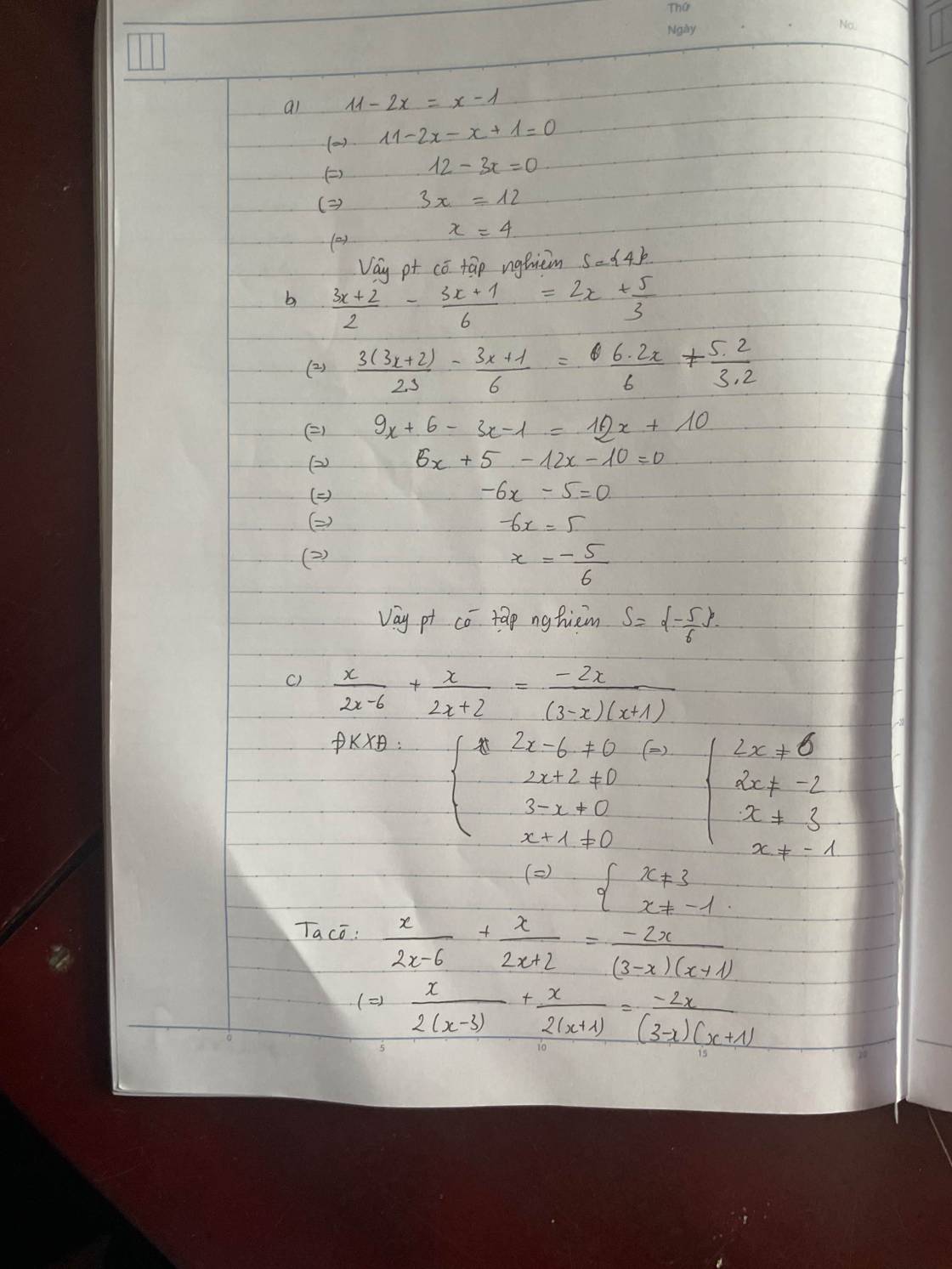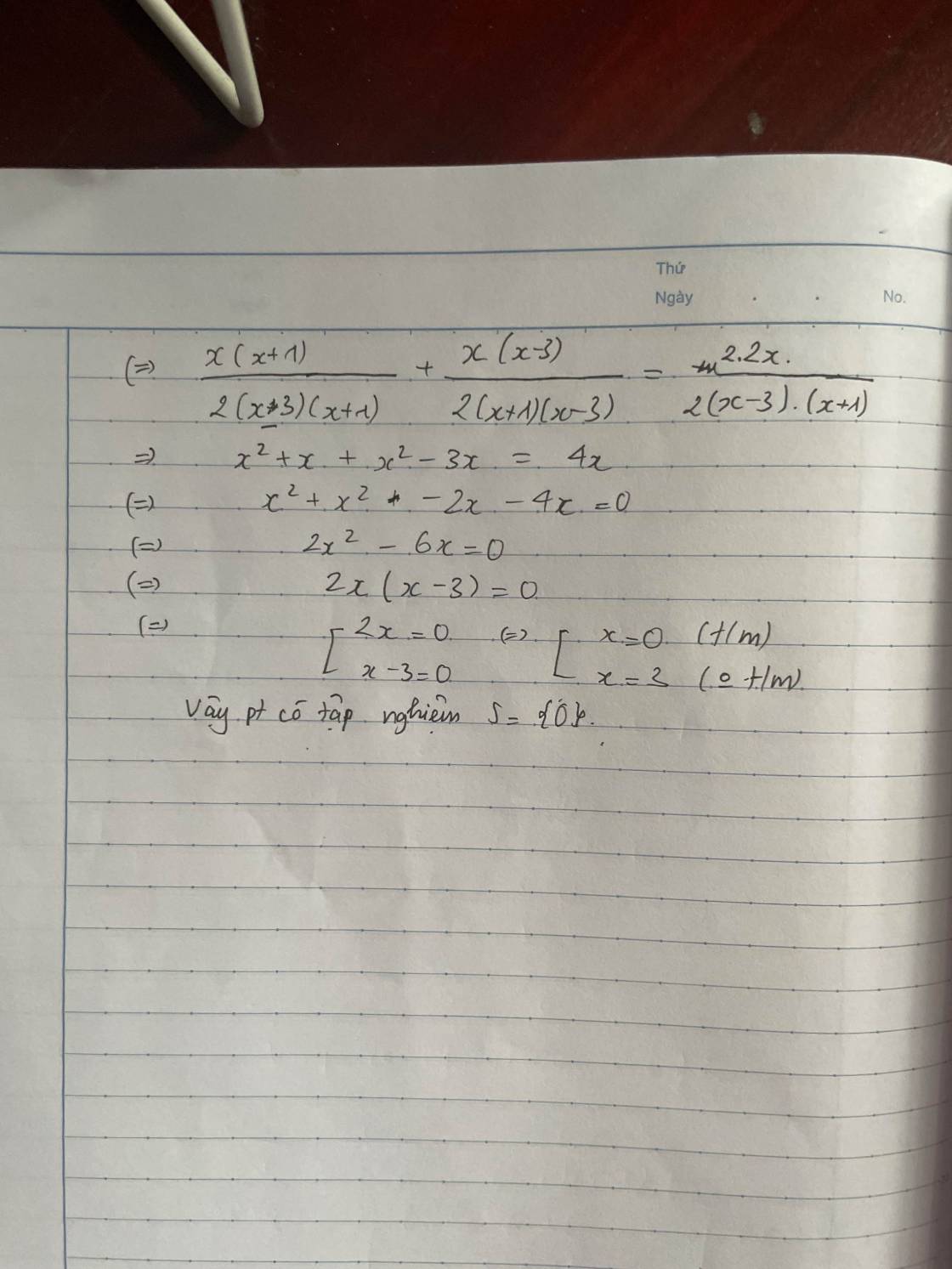Hãy nhập câu hỏi của bạn vào đây, nếu là tài khoản VIP, bạn sẽ được ưu tiên trả lời.

\(1.\dfrac{x-1}{3}-x=\dfrac{2x-4}{4}.\Leftrightarrow\dfrac{x-1-3x}{3}=\dfrac{x-2}{2}.\Leftrightarrow\dfrac{-2x-1}{3}-\dfrac{x-2}{2}=0.\)
\(\Leftrightarrow\dfrac{-4x-2-3x+6}{6}=0.\Rightarrow-7x+4=0.\Leftrightarrow x=\dfrac{4}{7}.\)
\(2.\left(x-2\right)\left(2x-1\right)=x^2-2x.\Leftrightarrow\left(x-2\right)\left(2x-1\right)-x\left(x-2\right)=0.\)
\(\Leftrightarrow\left(x-2\right)\left(2x-1-x\right)=0.\Leftrightarrow\left(x-2\right)\left(x-1\right)=0.\)
\(\Leftrightarrow\left[{}\begin{matrix}x=2.\\x=1.\end{matrix}\right.\)
\(3.3x^2-4x+1=0.\Leftrightarrow\left(x-1\right)\left(x-\dfrac{1}{3}\right)=0.\Leftrightarrow\left[{}\begin{matrix}x=1.\\x=\dfrac{1}{3}.\end{matrix}\right.\)
\(4.\left|2x-4\right|=0.\Leftrightarrow2x-4=0.\Leftrightarrow x=2.\)
\(5.\left|3x+2\right|=4.\Leftrightarrow\left[{}\begin{matrix}3x+2=4.\\3x+2=-4.\end{matrix}\right.\Leftrightarrow\left[{}\begin{matrix}x=\dfrac{2}{3}.\\x=-2.\end{matrix}\right.\)
\(1,\dfrac{x-1}{3}-x=\dfrac{2x-4}{4}\\ \Leftrightarrow\dfrac{x-1}{3}-x=\dfrac{x-2}{2}\\ \Leftrightarrow\dfrac{2\left(x-1\right)-6x}{6}=\dfrac{3\left(x-2\right)}{6}\\ \Leftrightarrow2\left(x-1\right)-6x=3\left(x-2\right)\\ \Leftrightarrow2x-2-6x=3x-6\\ \Leftrightarrow-4x-2=3x-6\)
\(\Leftrightarrow3x-6+4x+2=0\\ \Leftrightarrow7x-4=0\\ \Leftrightarrow x=\dfrac{4}{7}\)
\(2,\left(x-2\right)\left(2x-1\right)=x^2-2x\\ \Leftrightarrow2x^2-4x-x+2=x^2-2x\\ \Leftrightarrow x^2-3x+2=0\\ \Leftrightarrow\left(x^2-2x\right)-\left(x-2\right)=0\\ \Leftrightarrow x\left(x-2\right)-\left(x-2\right)=0\\ \Leftrightarrow\left(x-1\right)\left(x-2\right)=0\\ \Leftrightarrow\left[{}\begin{matrix}x=1\\x=2\end{matrix}\right.\)
\(3,3x^2-4x+1=0\\ \Leftrightarrow\left(3x^2-3x\right)-\left(x-1\right)=0\\ \Leftrightarrow3x\left(x-1\right)-\left(x-1\right)=0\\ \Leftrightarrow\left(x-1\right)\left(3x-1\right)=0\\ \Leftrightarrow\left[{}\begin{matrix}x=1\\x=\dfrac{1}{3}\end{matrix}\right.\)
\(4,\left|2x-4\right|=0\\ \Leftrightarrow2x-4=0\\ \Leftrightarrow2x=4\\ \Leftrightarrow x=2\)
\(5,\left|3x+2\right|=4\\ \Leftrightarrow\left[{}\begin{matrix}3x+2=4\\3x+2=-4\end{matrix}\right.\\ \Leftrightarrow\left[{}\begin{matrix}3x=2\\3x=-6\end{matrix}\right.\\ \Leftrightarrow\left[{}\begin{matrix}x=\dfrac{2}{3}\\x=-2\end{matrix}\right.\)
\(6,\left|2x-5\right|=\left|-x+2\right|\\ \Leftrightarrow\left[{}\begin{matrix}2x-5=-x+2\\2x-5=x-2\end{matrix}\right.\\ \Leftrightarrow\left[{}\begin{matrix}3x=7\\x=3\end{matrix}\right.\\ \Leftrightarrow\left[{}\begin{matrix}x=\dfrac{7}{3}\\x=3\end{matrix}\right.\)

7:
a: =>0,5x-5=2 hoặc 0,5x-5=-2
=>0,5x=3 hoặc 0,5x=7
=>x=6 hoặc x=14
b: |5x-2|=-3
mà |5x-2|>=0
nên ptvn
c: =>1/4x+3=0
=>1/4x=-3
=>x=-12

b) Ta có: \(x^3+4x+5=0\)
\(\Leftrightarrow x^3-x+5x+5=0\)
\(\Leftrightarrow x\left(x^2-1\right)+5\left(x+1\right)=0\)
\(\Leftrightarrow x\left(x+1\right)\left(x-1\right)+5\left(x+1\right)=0\)
\(\Leftrightarrow\left(x+1\right)\left(x^2-x+5\right)=0\)
mà \(x^2-x+5>0\forall x\)
nên x+1=0
hay x=-1
Vậy: S={-1}
a)x2-(x+3)(3x+1)=9
⇔(x-3)(x+3)-(x+3)(3x+1)=0
⇔x+3=0 hoặc 3x+1=0
1.x+3=0 ⇔x=-3
2.3x+1=0⇔x=-1/3
phương trình có 2 nghiệm x=-3 và x=-1/3

a: =>-3x=-12
=>x=4
b: =>3(3x+2)-3x-1=12x+10
=>9x+6-3x-1=12x+10
=>12x+10=6x+5
=>6x=-5
=>x=-5/6
c: =>x(x+1)+x(x-3)=4x
=>x^2+x+x^2-3x-4x=0
=>2x^2-6x=0
=>2x(x-3)=0
=>x=3(loại) hoặc x=0(nhận)

f. 5 – (x – 6) = 4(3 – 2x)
<=>5-x+6=12-8x
<=>7x=1
<=>x=\(\dfrac{1}{7}\)
g. 7 – (2x + 4) = – (x + 4)
<=>7-2x-4=-x-4
<=>x=7
h. 2x(x+2)\(^2\)−8x\(^2\)=2(x−2)(x\(^2\)+2x+4)
<=>\(2x\left(x^2+4x+4\right)-8x^2=2\left(x^3-8\right)\)
<=>\(2x^3+8x^2+8x-8x^2=2\left(x^3-8\right)\)
<=>\(2x^3+8x=2x^3-16\)
<=>\(8x=-16\)
<=>\(x=-2\)
i. (x−2\(^3\))+(3x−1)(3x+1)=(x+1)\(^3\)
<=>\(x-8+9x^2-1=x^3+3x^2+3x+1\)
<=>\(6x^2-2x-10=0\)
<=>\(3x^2-x-5=0\)
<=>\(\left[{}\begin{matrix}x=\dfrac{1+\sqrt{61}}{6}\\x=\dfrac{1-\sqrt{61}}{6}\end{matrix}\right.\)
k. (x + 1)(2x – 3) = (2x – 1)(x + 5)
<=>\(2x^2-x-3=2x^2+9x-5\)
<=>10x=2
<=>\(x=\dfrac{1}{5}\)
f. 5 – (x – 6) = 4(3 – 2x)
<=>5-x+6=12-8x
<=>7x=1
<=>x=\(\dfrac{1}{7}\)
g. 7 – (2x + 4) = – (x + 4)
<=>7-2x-4=-x-4
<=>x=7
h. \(2x\left(x+2\right)^2-8x^2=2\left(x-2\right)\left(x^2+2x+4\right)\)
<=>\(2x\left(x^2+4x+4\right)-8x^2=2\left(x^3-8\right)\)
<=>\(2x^3+8x^2+8x-8x^2=2x^3-16\)
<=>\(8x=-16\)
<=>x=-2
i.\(\left(x-2\right)^3+\left(3x-1\right)\left(3x+1\right)=\left(x+1\right)^3\)
<=>\(x^3-6x^2+12x+8+9x^2-1=x^3+3x^2+3x+1\)
<=>\(9x+6=0\)
<=>x=\(\dfrac{-2}{3}\)
k. (x + 1)(2x – 3) = (2x – 1)(x + 5)
<=>\(2x^2-x-3=2x^2+9x-5\)
<=>10x=2
<=>x=\(\dfrac{1}{5}\)

`a,x(x+3)-(2x-1).(x+30)=0`
`<=>x^2+3x-(2x^2+59x-30)=0`
`<=>x^2+56x-30=0`
`<=>x^2+56x+28^2=28^2+30`
`<=>(x+28)^2=28^2+30`
`<=>x=+-sqrt{28^2+30}-28`
`b,x(x-3)-5(x-3)=0`
`<=>(x-3)(x-5)=0`
`<=>` $\left[ \begin{array}{l}x=3\\x=5\end{array} \right.$
`c)1/(x-1)+5/(x-2)=(3x)/((x-1)(x-2))`
`đk:x ne 1,2`
`pt<=>x-2+5(x-1)=3x`
`<=>x-2+5x-5=3x`
`<=>6x-7=3x`
`<=>3x=7`
`<=>x=7/3`
`d)(x-1)/(x+1)+(x+1)/(x-1)=(4-2x^2)/(x^2-1)`
`đk:x ne +-1`
`pt<=>(x-1)^2+(x+1)^2=4-2x^2`
`<=>2x^2+2=4-2x^2`
`<=>4x^2=2`
`<=>x^2=1/2`
`<=>x=+-sqrt{1/2}`

Bài 3:
a) \(\left(x-6\right).\left(2x-5\right).\left(3x+9\right)=0\)
\(\Leftrightarrow\left(x-6\right).\left(2x-5\right).3.\left(x+3\right)=0\)
Vì \(3\ne0.\)
\(\Leftrightarrow\left[{}\begin{matrix}x-6=0\\2x-5=0\\x+3=0\end{matrix}\right.\Leftrightarrow\left[{}\begin{matrix}x=6\\2x=5\\x=-3\end{matrix}\right.\Leftrightarrow\left[{}\begin{matrix}x=6\\x=\frac{5}{2}\\x=-3\end{matrix}\right.\)
Vậy phương trình có tập hợp nghiệm là: \(S=\left\{6;\frac{5}{2};-3\right\}.\)
b) \(2x.\left(x-3\right)+5.\left(x-3\right)=0\)
\(\Leftrightarrow\left(x-3\right).\left(2x+5\right)=0\)
\(\Leftrightarrow\left[{}\begin{matrix}x-3=0\\2x+5=0\end{matrix}\right.\Leftrightarrow\left[{}\begin{matrix}x=3\\2x=-5\end{matrix}\right.\Leftrightarrow\left[{}\begin{matrix}x=3\\x=-\frac{5}{2}\end{matrix}\right.\)
Vậy phương trình có tập hợp nghiệm là: \(S=\left\{3;-\frac{5}{2}\right\}.\)
c) \(\left(x^2-4\right)-\left(x-2\right).\left(3-2x\right)=0\)
\(\Leftrightarrow\left(x^2-2^2\right)-\left(x-2\right).\left(3-2x\right)=0\)
\(\Leftrightarrow\left(x-2\right).\left(x+2\right)-\left(x-2\right).\left(3-2x\right)=0\)
\(\Leftrightarrow\left(x-2\right).\left(x+2-3+2x\right)=0\)
\(\Leftrightarrow\left(x-2\right).\left(3x-1\right)=0\)
\(\Leftrightarrow\left[{}\begin{matrix}x-2=0\\3x-1=0\end{matrix}\right.\Leftrightarrow\left[{}\begin{matrix}x=2\\3x=1\end{matrix}\right.\Leftrightarrow\left[{}\begin{matrix}x=2\\x=\frac{1}{3}\end{matrix}\right.\)
Vậy phương trình có tập hợp nghiệm là: \(S=\left\{2;\frac{1}{3}\right\}.\)
Chúc bạn học tốt!

\(\left(x-2\right)^3+\left(5-2x\right)^3=0\)
\(\Leftrightarrow\left(x-2+5-2x\right)\left(\left(x-2\right)^2-\left(x-2\right)\left(5-2x\right)+\left(5-2x\right)^2\right)=0\)
\(\Leftrightarrow\left(3-x\right)\left(x^2-4x+4-\left(5x-4x^2-10+4x\right)+25-20x+4x^2\right)=0\)
\(\Leftrightarrow\left(3-x\right)\left(x^2-4x+4-5x+4x^2+10-4x+25-20x+4x^2\right)=0\)
\(\Leftrightarrow\left(3-x\right)\left(9x^2-33x+39\right)=0\)
Phân tích tiếp nhé



a)\(2x^3=x^2+2x-1\Leftrightarrow2x^3-x^2-2x+1=0\Leftrightarrow x^2\left(2x-1\right)-\left(2x-1\right)=0\)
\(\Leftrightarrow\left(2x-1\right)\left(x^2-1\right)=0\Leftrightarrow\left(2x-1\right)\left(x-1\right)\left(x+1\right)=0\)
<=> 2x-1=0 hoặc x-1=0 hoặc x+1=0 <=> x=1/2 hoặc x=1 hoặc x=-1
b)\(x^2-4+\left(x-2\right)\left(3-2x\right)=0\Leftrightarrow\left(x-2\right)\left(x+2\right)+\left(x-2\right)\left(3-2x\right)=0\)
\(\Leftrightarrow\left(x-2\right)\left(x+2+3-2x\right)=0\Leftrightarrow\left(x-2\right)\left(5-x\right)=0\)
\(\Leftrightarrow\orbr{\begin{cases}x-2=0\\5-x=0\end{cases}}\Leftrightarrow\orbr{\begin{cases}x=2\\x=5\end{cases}}\)
a) 1
b) 2